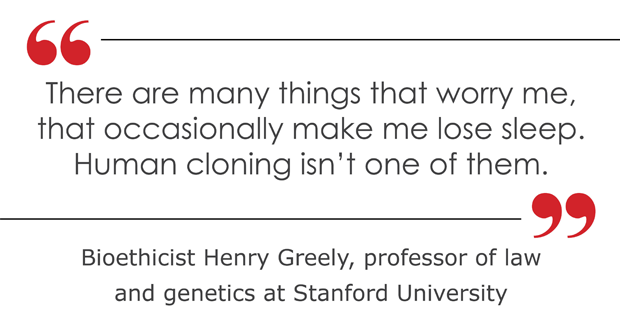The world's first genetically identical monkey clones have been created by Chinese scientists, who say they've broken barriers to human cloning.
A 2007 Health24 article predicted that human cloning was on the cards and that the world faced a stark choice between banning cloning of humans and finding ways to protect them from potential abuse of discrimination.
No human clones yet
Also in 2007 US researchers announced they had successfully created embryonic stem cells from cloned monkey embryos.
The current study was published online in Cell.
The researchers, instead, are touting the potential for improving primate studies into human health problems such as heart disease, cancer and Alzheimer's.
The two long-tailed macaques – dubbed Zhong Zhong and Hua Hua – were born eight and six weeks ago. Scientists used the same laboratory cloning process that created Dolly the sheep in Scotland in 1996, the researchers at the Chinese Academy of Sciences Institute of Neuroscience in Shanghai announced.
Technical barrier now broken
Zhong Zhong and Hua Hua are essentially identical twins, with identical DNA in all of their chromosomes, said researcher Mu-ming Poo, the institute's director.
"Humans are primates," Poo said. With the cloning of a primate species, "the technical barrier is now broken. In principle, that can be applied to humans."
The Chinese scientists and other experts say it's highly unlikely this advance will result in human clones in the foreseeable future.
Bioethicist Henry Greely, a professor of law and genetics at Stanford University, agrees that we shouldn't expect human cloning anytime in the near future.
The process used by the Chinese scientists relied on foetal cells rather than adult cells and is not very efficient, requiring many failed attempts just to create these two successful clones, Prof Greely said.
"There are many things that worry me, that occasionally make me lose sleep," Prof Greely said. "Human cloning isn't one of them."
Genetically identical offspring
Primate species have been notoriously resistant to attempts at cloning, Prof Greely said. Some species just are like that; for example, mice and cats are easy to clone, but rats and dogs are difficult.
The Chinese researchers created the two monkey clones using a process called somatic cell nuclear transfer, in which DNA drawn from a cell is inserted into an egg. The egg is then implanted into a female for gestation.
Eggs created with the same DNA will result in genetically identical offspring, even if they are implanted into different females.
The researchers overcame a big hurdle to cloning in primates by manipulating the genes of the newly created clone egg, turning on and off any genes that would inhibit embryo development.
They tried using eggs implanted with DNA from adult cells, but none of the monkey clones created this way lived longer than a few hours past birth.
Success came when the research team drew DNA from foetal monkey cells and used that to create clone eggs. They created 127 eggs, 79 of which were transferred to 21 females.
A boon for research
Four pregnancies resulted, but there were two miscarriages within two months of gestation. The other two were successfully birthed, and named Zhong Zhong and Hua Hua.
The two clones appear physically and mentally healthy. They are cared for by humans, and actively play with each other, Poo said. They'll be monitored for any signs of illness or abnormal behaviour.
The researchers said their cloning process will prove a boon for research on human diseases. Medicines and treatments can be tested on cloned monkeys born genetically identical except for traits or illnesses programmed into their DNA prior to birth, Poo said.
They plan to use cloned monkeys to first study neurodegenerative diseases like Parkinson's disease and Alzheimer's disease, Poo said. Immune disorders and cancers are among hundreds of other illnesses that could be researched using genetically engineered clones.
Image credit: iStock
Watch this video of Zhong Zhong and Hua Hua:




 Publications
Publications
 Partners
Partners












